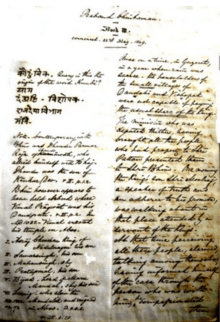Alexander Kinloch Forbes
| Alexander Kinloch Forbes | |
|---|---|
 Portrait and signature of Alexander Kinloch Forbes | |
| Born |
July 7, 1821 London |
| Died |
August 31, 1865 (aged 44) Poona (now Pune) |
| Occupation | Writer, judge |
| Language | English, Gujarati |
| Nationality | British |
| Alma mater | Haileybury |
| Notable works | Râs Mâlâ |
| Spouse | Margaret Moir Forbes-Mitchell |
| Children | Six |
Alexander Kinloch Forbes (Gujarati: એલેક્ઝાન્ડર કિન્લોક ફૉર્બસ) (1821–1865) was a scholar of the Gujarati language and a colonial administrator in British India.
Early life
Forbes was born in London on 7 July 1821 to John Forbes-Mitchell (1786-1822) of Thainston and Ann Powell (m. 1809 d. 1861). He was the youngest among six siblings.[1] He was christened on 9 August 1821 at St. Mary, St. Marylebone, London.[2] He was educated at a school in Finchley. He articled to George Basevi, an architect, for eight months but later joined a college Haileybury as he was appointed to Bombay Civil Service by Sir Charles Forbes in 1840. He left it in 1842 and arrived in Bombay, India in November 1843.[3][4]
Administrative career

He spent his initial two and half years as Assistant Collector of Ahmednagar and Khandesh. Later he was appointed as Assistant Judge in Ahmedabad in November 1846 where he noted the absence of literary society.[3] He served in different departments in Gujarat such as First Assistant Collector of Ahmedabad and Political Agent to Mahi Kantha until he went home in March 1854. During this period he collected material which was later published as Rasmala. He went home in 1854 and returned at the end of 1856. He was appointed as Assistant Judge at Surat and later, in 1858, appointed on the same post at Khandesh. He want to return to Gujarat so he applied for vacant Political Agency of Kathiawar. It was turned down but later was moved to Kathiawar in September 1859 to subdue rebellion by Vaghers. The rebellion subdued by March 1860 and he returned to Surat as the Acting Judge. He was appointed as Secretary to Government in March 1861. He accepted post in Sudder Court which, in August 1862, made him one of the first six Judges of Bombay High Court which he remained till his death. He also held the honorary post of Vice Chancellor of the University of Bombay. The A. Kinloch Forbes Gold Medal was awarded for proficiency in law at LL.B. Examination of the University.[4][5]
Literature
He met Dalpatram, a Gujarati poet, in 1848 who taught him Gujarati while Forbes encouraged him to write in Gujarati. They became close friends. He inspired Dalpatram to write Laxmi Natak published in 1849, the first play in Gujarati, based on Greek drama Plutus.[6][7]
On 26 December 1848 he started the Gujarat Vernacular Society in Ahmedabad, which contributed to a literary renaissance in Gujarati. The fund of Rs 9601 was raised from locals, Baroda State and British officers. The society started the first public library, first school for girls, first periodical, first newspaper and first literary magazine of Gujarat.[3] He also founded Andrews Library in Surat in 1850 and Gujarati Sabha in Bombay in 1865. Gujarati Sabha was later renamed Farbas Gujarati Sabha after him. He organized conclave of Gujarati poets in 1852 at Idar State. Dalpatram's Farbesvilas was an account of these conclave.[6][7] He visited many Jain libraries in search of bards who told the stories of history of Gujarat. In 1856, he published Râs Mâlâ: Hindoo Annals of the Province of Goozerat, in Western India which documented the history from 8th century to arrival of British and folk literature of Gujarat in two volumes.[6][8] It was later translated into Gujarati by Ranchhodlal Udayaram Dave in 1869.[7] He also translated Dalpatram's essay Bhoot Nibandh as Demonology and Popular Superstitions of Gujarat.
Death
He died in Poona (now Pune, Maharashtra, India) in 31 August 1865 after brief illness.[1][4] Dalpatram composed Farbes viraha, a Gujarati elegy in his memory.[6][7][9]
Personal life
He married Margaret-Moir Forbes-Mitchell (1825-1 November 1904), daughter of Henry David Forbes-Mitchell of Bawlgownie, in Bombay on 25 March 1846.[10] They had six children; Edward Esme Forbes (1855-1920), Emmeline Maria Elizabeth Forbes, Margaret Theodora Lawrence Forbes (d. 1939), John Fraser Forbes (1847-1887), Henry David Erskine Forbes (1849-1920), Alexander Abernethie Forbes (b. 1851).[1]
Selected works
- Alexander Kinloch Forbes (1856). Râs Mâlâ:Hindoo Annals of the Province of Goozerat, in Western India. 1. Richardson Bros.
Further reading
- Mehta, Dipak (2015). Arvachintana Suryodayna Chhadidar (Life and Works of Alexander Kinloch Forbes) (in Gujarati). Ahmedabad: Gujarat Vidyasabha. ISBN 978-93-83814-45-9.
References
- 1 2 3 The Marquis of Ruvigny and Ranieval (May 2013). The Plantagenet Roll of the Blood Royal: The Mortimer-Percy Volume. Heritage Books. pp. 228–230. ISBN 978-0-7884-1872-3.
- ↑ "England Births and Christenings, 1538-1975," database, FamilySearch : 30 December 2014, Alexander Kinlock Forbes Mitchell, Alexander Kinlock Forbes Mitchell; citing, reference; FHL microfilm 580,910, 580,911, 580,912.
- 1 2 3 Shastri, Paul John & Parth (31 August 2015). "Forbes, Gujarati's renaissance man". The Times of India. Retrieved 1 September 2015.
- 1 2 3 Forbes; Nairne (1878). Râs Mâlâ: Hindoo Annals of the Province of Goozerat, in Western India. Richardson. pp. xv–xvi.
- ↑ https://web.archive.org/web/20170721201601/http://bombayhighcourt.nic.in/libweb/puisnejudge/judges/ForbesAK.pdf
- 1 2 3 4 Unnithan, Chitra (2014-02-22). "Briton inspired Dalpatram to write in Gujarati language". The Times of India. Retrieved 2014-02-22.
- 1 2 3 4 Amaresh Datta (1988). Encyclopaedia of Indian Literature. Sahitya Akademi. p. 1319. ISBN 978-81-260-1194-0.
- ↑ Surinder Singh; I. D. Gaur (2008). Popular Literature and Pre-modern Societies in South Asia. Pearson Education India. pp. 181–182. ISBN 978-81-317-1358-7.
- ↑ Edith Hall; Amanda Wrigley (2007). Aristophanes in Performance, 421 BC-AD 2007: Peace, Birds and Frogs. MHRA. p. 117. ISBN 978-1-904350-61-3.
- ↑ The Gentleman's Magazine, and Historical Chronicle, for the Year ... Edw. Cave, 1736-[1868]. 1846. p. 639.